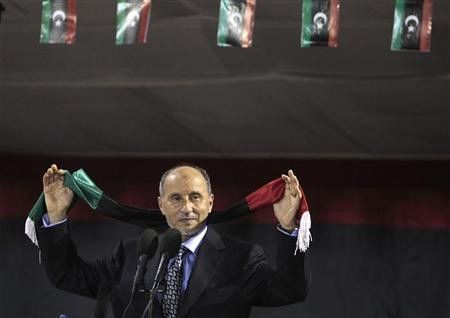Residents of besieged Gaddafi town given two days to go

Libyan transitional forces besieging a bastion of forces loyal to Muammar Gaddafi on Tuesday gave residents two days to leave before a threatened onslaught, and fears rose for the fate of civilians trapped in the last redoubts of the fallen strongman.
Forces of the new ruling National Transitional Council (NTC) that overran Tripoli on August 23 have met unexpectedly stout resistance in five days of fighting for the town of Bani Walid 180 km (110 miles) southeast of the capital.
Along with Gaddafi's hometown Sirte on the central Mediterranean coast and Sabha in the remote southern desert, Bani Walid counts among the last strongholds of old regime fighters and their resistance has impeded NTC efforts to normalise life in the oil-producing North African state again.
Residents fleeing the town have reported days of intense firefights, and NATO warplanes were backing up NTC fighters with air strikes on pro-Gaddafi rocket positions.
Families trapped there for weeks started to slip out after Gaddafi forces abandoned some checkpoints on the outskirts, and dozens of cars packed with civilians streamed out of the area on Monday and Tuesday.
NTC field commanders said people in Bani Walid, dominated by a tribe, the Warfalla, that was a pillar of Gaddafi's rule, had been told via broadcast radio messages they had two days to leave town before it would come under full-blown attack.
I think only 10 percent of the people are Gaddafi supporters. They are fanatics. And the rest are waiting to be liberated. We have given them two more days to leave the city, NTC fighter Abumuslim Abdu told Reuters.
The United Nations said it was worried about the plight of civilians marooned inside besieged pro-Gaddafi towns.
Our big concern right now is Sirte, where we are receiving reports that there's no water and no electricity, U.N. humanitarian chief Valerie Amos told Reuters in Dubai.
Some NTC combatants said they suspected local fighters of the Warfalla tribe, Libya's largest, were passing tips to Gaddafi forces in Bani Walid. We believe there are traitors among them, said Mohammed el Gahdi, from the coastal city of Khoms.
NTC military spokesman Ahmed Bani told reporters the plan for Bani Walid for now was to wait.
When our forces entered Bani Walid they found the brigades of Gaddafi using citizens as shields, he said, adding that missile launchers had been placed on the roofs of homes, making it difficult for NTC forces or NATO warplanes to strike.
NTC CHIEF CALLS FOR CALM
Despite the fighting, efforts to get Libya running again were gathering pace, with NTC chairman Mustafa Abdel Jalil making his first public speech in Tripoli late on Monday -- just hours after Gaddafi loyalists attacked an oil refinery.
Despite the assault, Abdel Jalil felt confident enough to address a crowd of about 10,000 people in the central Martyrs' Square and use the speech to call for restraint.
We seek a state of law, prosperity and one where sharia (Islamic law) is the main source for legislation, and this requires many things and conditions, he said, adding that extremist ideology would not be tolerated.
Abdel Jalil has said that, along with taking control of pro-Gaddafi enclaves, capturing or killing the fugitive leader is a priority and only then could Libya be declared liberated.
A Syrian-based television station said on Monday it had received a new message from the Gaddafi, who has issued regular battle calls to his followers in the three weeks since Tripoli was captured, but could not broadcast it for security reasons.
It quoted the ousted leader, who it said was still in Libya, as saying: We cannot give up Libya to colonisation one more time...There is nothing more to do except fight until victory.
Human rights group Amnesty International warned in a report on Tuesday that the security vacuum risked plunging Libya into a bloody vortex of attacks and reprisals.
We need to open the courts to anyone who harmed the Libyan people in any way. The judicial system will decide, Abdel Jalil said in Tripoli, urging NTC fighters to respect that principle.
Despite the attack on the oil refinery near coastal Ras Lanuf, Libya continued to ramp up efforts to get oil pumping again.
The Arabian Gulf Oil Company (Agoco) said on Tuesday that production from the eastern oilfield of Sarir had reached 160,000 barrels per day (bpd) and that it had begun to send crude oil to the export terminal of Tobruk.
Libya holds Africa's largest crude oil reserves and sold about 85 percent of its exports to Europe under Gaddafi. Western oil firms, including Italy's Eni and Austria's OMV, are keen to restore production.
SON UNDER SURVEILLANCE
One of Gaddafi's sons, Saadi, arrived in neighbouring Niger on Sunday after crossing the southern Sahara desert frontier. On Monday the U.S. State Department said Niger's government had confirmed to it that it would detain Saadi Gaddafi.
But a Nigerien government spokesman said Saadi was only being watched for now. Nothing has changed in the government's position. There is no international search for him. Like the others he is just under surveillance, he said, referring to other Gaddadfi loyalists who have recently fled to Niger.
Two other sons and Gaddafi's only biological daughter have made their way out to Algeria. One son is reported to have died in the war and three others are still on the run.
The NTC has said it will send a delegation to Niger to seek the return of anyone wanted for crimes under Gaddafi's rule.
Niger, like Algeria, has cited humanitarian reasons for accepting fugitives of the former government, but has promised to respect its commitments to the International Criminal Court, which wants to try Gaddafi, his son Saif al-Islam and intelligence chief Abdullah al-Senussi for war crimes.
© Copyright Thomson Reuters 2024. All rights reserved.





















